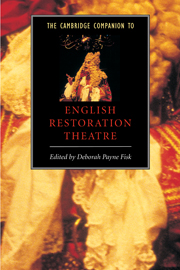Book contents
- Frontmatter
- 1 The theatre
- 2 The performance
- 3 Adaptations and revivals
- 4 Comedy
- 5 Tragedy
- 6 Tragicomedy
- 7 Farce
- 8 Restoration and settlement
- 9 Change, skepticism, and uncertainty
- 10 Drama and political crisis
- 11 Spectacle, horror, and pathos
- 12 Gender, sexuality, and marriage
- 13 Playwright versus priest
- 14 The canon and its critics
- Biographies and selected bibliography
- Index
14 - The canon and its critics
Published online by Cambridge University Press: 28 May 2006
- Frontmatter
- 1 The theatre
- 2 The performance
- 3 Adaptations and revivals
- 4 Comedy
- 5 Tragedy
- 6 Tragicomedy
- 7 Farce
- 8 Restoration and settlement
- 9 Change, skepticism, and uncertainty
- 10 Drama and political crisis
- 11 Spectacle, horror, and pathos
- 12 Gender, sexuality, and marriage
- 13 Playwright versus priest
- 14 The canon and its critics
- Biographies and selected bibliography
- Index
Summary
Since its own time, Restoration drama has been controversial, provoking radically different judgments about its aesthetic value and moral significance. Critical debates reach back at least as far as 1698 when the High Tory churchman, Jeremy Collier, published a scathing indictment of Restoration comedy for its immorality and contempt for authority; various defenders of the drama, including playwrights such as William Congreve, countered these charges by arguing that comedy satirizes vice and vanity to secure the socioeconomic stability premised on feminine virtue and masculine property rights. The terms of this controversy have persisted for three hundred years – Collier and his critical descendants argue that Restoration comedy is obscene, blasphemous, and heartless; its champions claim that it offers timeless insights into the human condition or tellingly satirizes the vices and follies of its era. If these responses to the drama often tell us more about their authors than about the plays themselves, they also describe a contentious history of efforts to domesticate a morally suspect theatre by assimilating Restoration comedy to larger critical and ideological paradigms.
- Type
- Chapter
- Information
- The Cambridge Companion to English Restoration Theatre , pp. 226 - 242Publisher: Cambridge University PressPrint publication year: 2000
- 3
- Cited by

